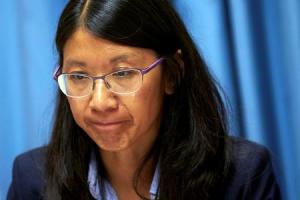
Afghan guards stand at the gate of Medecins Sans Frontieres (MSF) hospital after an air strike in the city of Kunduz, Afghanistan October 3, 2015. REUTERS/Stringer |
|
By Stephanie Nebehay and Daniel Bases
GENEVA/NEW YORK (Reuters) - Medecins Sans Frontieres called on Wednesday for an independent international commission to investigate the deadly U.S. bombing of its hospital in Kunduz in Afghanistan, which it deems a war crime.
The medical charity said that the inquiry would gather facts and evidence from the United States, NATO and Afghanistan, as well as testimony from MSF staff and patients who survived Saturday's attack.
Only then would MSF consider whether to bring criminal charges for loss of life and partial destruction of its trauma hospital, which has left tens of thousands of Afghans without access to health care, it said.
"If we let this go, as if was a non-event, we are basically giving a blank cheque to any countries who are at war," MSF International President Joanne Liu told a news briefing.
"If we don't safeguard that medical space for us to do our activities, then it is impossible to work in other contexts like Syria, South Sudan, like Yemen."
In New York, Jason Cone, executive director of MSF in the United States, called for the International Humanitarian Fact-Finding Commission to be activated for the first time since its 1991 creation under the Geneva Conventions.
Cone urged U.S. President Barack Obama to consent to the commission. "Doing so will send a powerful signal of the U.S. government's commitment to and respect for international humanitarian law under rules of war," Cone said at a news conference.
Liu spoke of the chaos as the bombs fell for an hour.
View gallery

Joanne Liu, president of Medecins Sans Frontieres (MSF) International, pauses before making her stat …
"Our patients burned in their beds, MSF doctors nurses, and other staff were killed as they worked. Our colleagues had to operate on each other," she said.
The United States military took responsibility on Tuesday for the air strike that killed 22 people, including 12 MSF staff, calling it a mistake.
U.S. Defense Secretary Ash Carter, speaking to reporters in Rome on Wednesday, said: "We are conducting a full and transparent investigation and will make the findings of that investigation known as they are found and will hold accountable anyone responsible for conduct that was improper."
The Afghan Ministry of Defense said on Sunday Taliban fighters had attacked the hospital and were using the building "as a human shield", which the medical group denied, while pointing out it would be a war crime not to treat the wounded.
'WAR HAS RULES'
Liu said an impartial commission, which can be set up at the request of a single state under the Geneva Conventions that establish international standards for conducting war, was needed due to "inconsistencies between the U.S. and Afghan accounts".
"We cannot rely on internal investigations by U.S, NATO and Afghan forces," she said.
The United Nations has condemned the attack but said it would wait for the results of U.S., NATO and Afghan investigations before deciding whether to support an independent probe.
Asked to clarify whether MSF would seek criminal justice, MSF lead legal counsel Francoise Saulnier told Reuters: "We don't know what will be the next step. We don't want to eliminate any option."
MSF said it sent a letter on Tuesday to the 76 countries who ratified the additional protocol of the Geneva Convention that set up the Swiss-based commission of 15 experts in 1991. It was in talks with Switzerland about maybe convening the commission.
Neither the United States nor Afghanistan are signatories to the commission, and the consent of the states involved is necessary to activate the unprecedented inquiry, Saulnier said.
MSF's hospital in Kunduz had treated nearly 400 people, including some Taliban, wounded in heavy fighting in the days before the attack, MSF's Bruno Jochum said.
Its GSP coordinates had been shared with all authorities.
"We had eight ICU (intensive care unit) beds with ventilators, this was high-tech medicine. This was not the little bush hospital. You could not miss it," Liu said.
"Today we say enough, even war has rules."
(Additional reporting Steve Scherer in Rome; Editing by Alison Williams and Grant McCool)